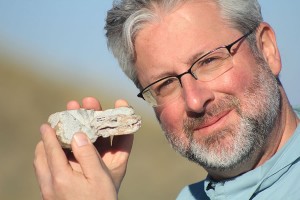 In a new television series on PBS, an evolutionary paleontologist tries to convince viewers that they are direct descendants of fish from millions of years ago.
In a new television series on PBS, an evolutionary paleontologist tries to convince viewers that they are direct descendants of fish from millions of years ago.
Dr. Neil Shubin is a professor at the University of Chicago who primarily studies evolution. In 2008, Shubin published a best-selling book titled Your Inner Fish: A Journey into the 3.5-Billion-Year History of the Human Body, in which he compares the human body with the anatomy of a fish.
Shubin generated widespread publicity in 2006 when he announced the discovery of the Tiktaalik rosae fossil. Shubin claims this fossil is an important “transitional form” between fish and land animals. However, one Ph.D. Christian scientist has since described Shubin’s assertion as an “insupportable imaginative atheistic answer” to the origin of land animals.
Last week, PBS premiered a TV series which spotlights Shubin and his research. The series, titled Your Inner Fish, explores the supposed evolutionary history of humans.
“The series is full of revelations that will surprise many viewers,” a description of the show on the PBS website states. “Among the key insights: Our hands evolved from the fins of prehistoric fish. Our skin, hair and teeth can be traced to early reptiles. And our remarkable color vision is a legacy from ancient primates.”
In the TV series, Shubin invites the audience to “come face-to-face with your ‘inner fish.’”
“Using both the fossil record and DNA evidence, [Shubin] traces various parts of our body’s structure to creatures that lived long, long ago,” the PBS series overview says. “Along the way, he makes it clear that we can thank our fishy origins for many human characteristics.”
Shubin says his “passion” is the proselytization of evolutionary theory, which he hopes to accomplish with the PBS series.
“You’re not going to change everybody’s mind, but you’re going to affect a few, most definitely,” he said, according to a recent article in Slate. “And that’s kind of my passion. That’s what I think I can bring to the table.”
According to PBS, this week’s episode of Your Inner Fish will be titled “Your Inner Reptile” and will trace humans’ theoretical evolution back to reptile species. Then, the third episode of the series will be titled “Your Inner Monkey.”
Dr. Elizabeth Mitchell is a researcher for Answers in Genesis who graduated summa cum laude from Furman University. On Saturday, Mitchell published an online review of Your Inner Fish’s first episode, in which she suggests that many of Shubin’s assertions are unfounded.
“Like the new Cosmos,” Mitchell wrote, “Your Inner Fish juxtaposes factual human anatomy with tiresome tales that misleadingly suggest Shubin’s evolutionary interpretations superimposed on the fossils, genetics, embryology, and anatomy in the episode are as trustworthy as the observational science.”
In the first episode of Your Inner Fish, Shubin argues that the human body’s susceptibility to regular ailments—such as hernias—is evidence of an evolutionary background; “We are, every one of us, just a jury-rigged fish,” he states. However, Mitchell offers a different explanation for the apparent flaws in people’s bodies.
“God designed a perfect human body along with a perfect world in the beginning,” Mitchell wrote. “…And God warned Adam that rebellion would have consequences (Genesis 2:16–17). Adam did rebel and ever since that day the entire world has groaned (Romans 8:22) under sin’s curse. People’s bodies have worn down, gotten ill, and died.”
“The problem,” Mitchell continued, “is neither bad design nor evolutionary bondage, but the perversion of God’s good original designs as a consequence of man’s rebellion against the Creator. We should be thankful that our bodies work as well as they do and that embryologic development usually operates as it should.”
“Anyone who has studied human anatomy and physiology without evolutionary presuppositions—as I, a physician, have been privileged to do—should not recognize our ‘inner fish’ but instead the hand of the Master Designer, our Creator and Savior Jesus Christ (Colossians 1:16–17), and with the psalmist declare we are ‘fearfully and wonderfully made’ (Psalm 139:14),” Mitchell concluded.
Photo: PBS
Become a Christian News Network Supporter...


